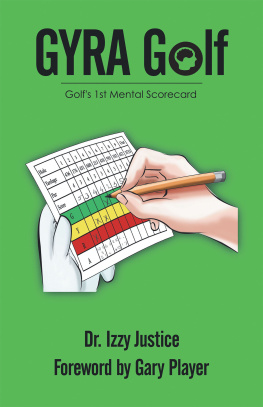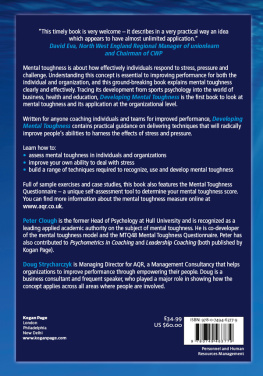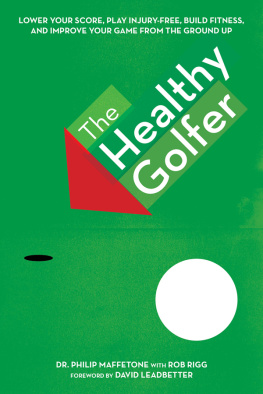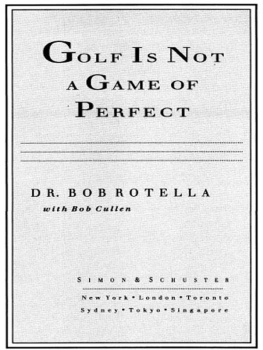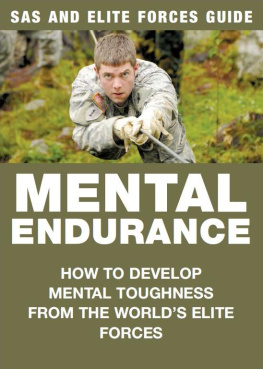Weve probably all heard someone say that golf is 90% mental and only 10% physical. This books series of real life experiences clearly highlights why theres much truth in that statement. The winners stories presented here demonstrate that whatever their circumstances, mentally strong players are able to produce positive outcomes, often against all odds.
The authors have successfully sought out first-hand evidence from professional and elite amateur players, with the resulting dialogues encapsulating all that is good in preparation. They then elaborate and reflect on those attitudes that form the bedrock of mental toughness.
The good news is theres absolutely no reason why any golfer whatever their standard cannot benefit from the insights unearthed in this book. The stories provide potent evidence of the power of the mind.
All three authors are passionate about improving the performance of every golfer. Through their interviews they have uncovered the critical psychological factors that make winners factors accessible to all players. These fascinating stories, relayed through the players own words, represent a refreshing way to guide, inform and expand our mental approaches to performance.
The authors are experts in this field and should be commended for providing an easy-to-read and understandable book, rather than indulging in abstract principles, terms and concepts. The experiences of mental toughness told in these pages will prove an important stepping stone towards wider acceptance of the value of developing a better mental approach to golf an area of performance preparation all too often neglected by the majority of players.
Theres a well-known phrase that says, if we do not change direction then we are likely to end up with what we always had. In many cases what we always had was poor performance resulting in emotional dissatisfaction. This book can help you change the way you think about the mental side of golf, while simultaneously providing you with a highly enjoyable read.
Introduction
Nobody arrives on tour or in the upper realms of amateur golf without being able to hit the ball well. What determines who progresses to the next level, and who flatters only to deceive, is often what goes on between the ears. Ninety percent of golf is played from the shoulders up, according to Milfred Deacon Palmer. What did he know, you might ask? Enough to equip son, Arnold, with a mind and game that took the world of golf by storm in the late 1950s and 1960s.
But was he right? Over the years, top golfers are often asked the question, what percentage of the game is technical and what mental? And while not all would agree with Deacon Palmer, the majority would afford the mental side at least 50% status, and none would rate it low enough to dismiss as irrelevant.
Once most golfers have been playing for a certain length of time, the swing changes required to take them from where they are to where theyd like to be require more effort and practice than theyre able or willing to give. Nick Faldo is probably the most notable exception, but how much time did he devote to it? Far more than you can probably spare! And what may feel like quite dramatic swing changes to us often barely register in the eyes of others.
So how can average golfers with swings that are far from technically perfect hope to improve significantly? While wed stop short of saying that mental skills are easy to acquire or learn, we do believe that for most golfers they offer a more achievable road to improvement than a full swing makeover. In fact the potential for improvement due to mental skills is probably much higher proportionally for average golfers than for those who already swing the club well. Mental strength can overcome, or at least compensate for mechanical deficiencies. Yet all too often, the amount of time golfers devote to the technical side of the game is at best out of all proportion to, and at worst to the exclusion of, that which they devote to the mental side.
Some perhaps feel that if theres much they could be doing better technically, theres little point in pursuing new mental approaches. But this is simply not the case. Even if we cant swing perfectly, theres no logical reason why we should be able to produce a consistently repeatable swing for 15 holes, only for it to suddenly fall apart as we come down the stretch with victory, a personal best, or a much sought-after handicap cut at our mercy.
The stakes may not be as high for us in terms of reward or prestige as they are for top pros, but the feelings associated with either success or failure are often every bit as real. Winning a big club competition can bring delight equivalent to that of winning The Open; throwing away a golden opportunity can bring equal frustration and despondency.
There are many facets to mental fortitude on the course. For example, a greater degree of common sense could reduce our scores overnight without the need for any unusual mental skills. Most of us attempt at least one ridiculously foolish do-or-die shot a round a brave recovery from the woods, or a shot over water that has a one-in-twenty chance of success. Yet invariably, though weve never practised these shots, our minds somehow convince us we can pull them off. Replacing just that one big number with a percentage bogey could instantly knock two or three shots a round off our scores and keep us in a good frame of mind rather than slipping into a card-wrecking red mist! Equally there are more specific mental skills that can enable us to cope better when we find ourselves facing a single crucial shot, or trying to get back to the clubhouse with a score intact as the internal pressure mounts. This book provides highly personalised accounts of both.
It adopts an informal, rather than academic style, offering privileged access to the minds of top British golfers in specific rounds, events or phases of their careers where the power of the mind helped them overcome internal and sometimes external adversity. There are also chapters with a top caddy and a top coach the people at the coalface, if you like, of trying to guide their employers towards correct thinking both prior to and during tournaments. The narrative style throughout is deliberate. We think it makes for a better read than a series of specific mental skills lessons. So dont worry were not taking you back to school.
Many of the players names youll be familiar with, others perhaps less so. But all are gifted golfers for whom success more often than not depends on what goes on between the ears. Some of it may indeed just be common sense. But then, you can probably recall countless incidents on the course where in desperation, anger or panic, common sense went out of the window to your cost, provoking the kind of cold light of day if only Id done that post-round analysis you hear in every golf club bar. Imagine how much more success you might enjoy if you were in mental control enough to do that more often.
There are other mental skills that go beyond just common sense and will require some work on your part. Youll discover here examples of some of the skills various players have adopted to help them cope. You may simply be able to replicate what they have done, but equally you may need to seek expert advice. If youre serious about your game and want to improve you should be no less concerned about seeking the advice of a sports psychologist than you would in turning to a qualified PGA pro. In the same way that there is little point in going to an orthopaedic surgeon if you have a heart problem, theres little point getting your swing remodelled if your golfing problem lies in the mind.


